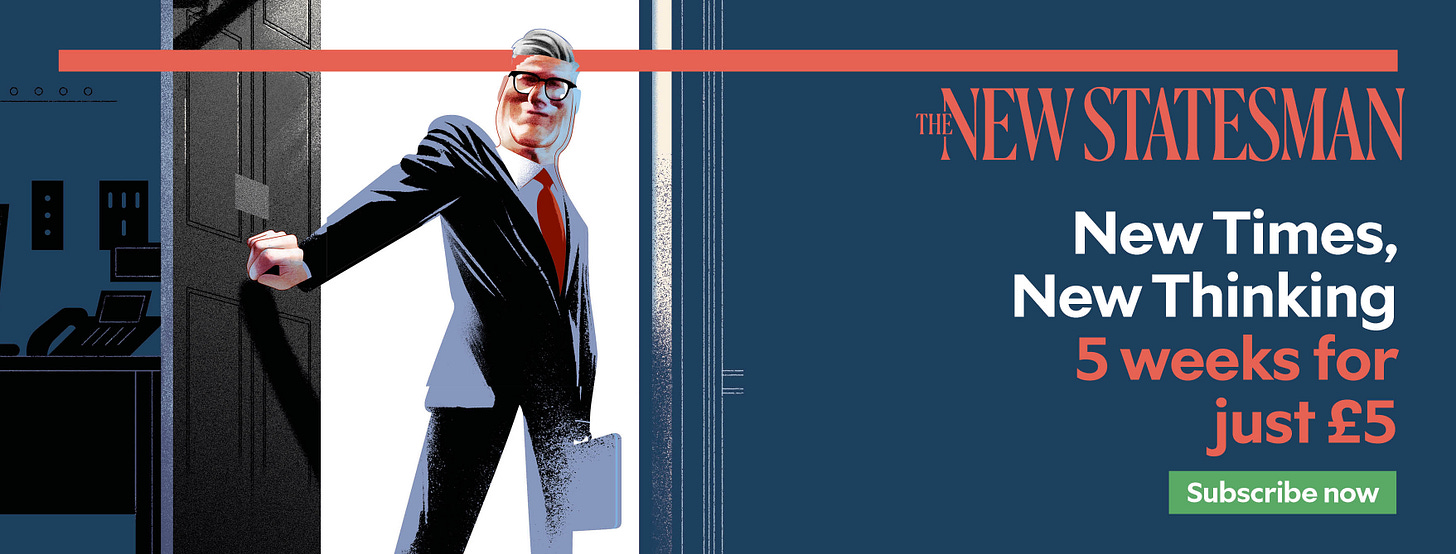Morning Call: Labour’s wealth tax game
Why it suits Rachel Reeves to keep everyone guessing about the Budget.
Good morning, it’s George here. The next Budget isn’t expected until November but speculation about its contents is already dominating politics. Below I explore what’s behind Labour’s apparent flirtation with a wealth tax.
Back in March, Rachel Reeves made a telling intervention at Prime Minister’s Questions. As Richard Burgon, the Corbynite MP for Leeds East, demanded a wealth tax in place of disability benefit cuts, Reeves shook her head with the vigour of someone who plainly regarded this as a terrible idea.
Yet four months later, the air is thick with talk of Labour adopting just such a measure. After Neil Kinnock proposed a tax of 2 per cent on assets worth more than £10m, No 10 and No 11 had the chance to rule this option out – and refused to do so. Heidi Alexander, the Transport Secretary, would only say yesterday that the tax was not discussed “directly” at the cabinet’s Chequers away day. What’s changed?
For one thing, tax will have to be much more central to Reeves’ next Budget than she ever wanted. Last November she told the Confederation of British Industry’s conference that “public services now need to live within their means” and that “I’m not coming back with more borrowing or more taxes”. You won’t hear the Chancellor, who could face a £20bn-£40bn black hole, repeat such language now.
But a Kinnock-style wealth tax isn’t going to happen for two reasons. First, it would make the UK a distinct outlier at a time when Reeves is striving to maintain international competitiveness (according to Sky News, of the 38 OECD countries only Colombia, Norway, Spain and Switzerland levy net wealth taxes). Second, HMRC lacks the data on property and pensions required to introduce a general wealth tax (and it would take several years to establish a new system).
Yet it suits Labour to maintain ambiguity over this issue. It avoids another public row with the party’s soft left, of which Kinnock is the founding father, and it also allows Reeves to surprise business on the upside when she delivers that Budget.
But while the Chancellor won’t be introducing a wealth tax, she will be taxing wealth more. That much is guaranteed by the government’s decision to maintain Labour’s manifesto pledge not to raise income tax, VAT and National Insurance on workers. “There’s a lot else that could be done not to tax people who are very economically insecure at the moment,” a No 10 aide tells me.
What could that mean? Options being explored by the Treasury include higher taxation of dividends through a rise in the 39 per cent rate or the abolition of the £500 tax-free allowance – as floated in Angela Rayner’s once-dismissed memo – and an online betting tax (as proposed by Gordon Brown in his New Statesman guest edit), as well as a rise in the bank profits levy.
Pension tax relief could also be curbed for higher earners and some even speculate whether Reeves might introduce a new top rate of income tax (which, they argue, would not amount to a technical manifesto breach).
Here is the political challenge for Labour. The panoply of measures to be announced this autumn will lack the totemic status of a wealth tax even as, to echo Denis Healey, there are “howls of anguish” from the rich. For proof of that, recall Reeves’ first Budget which imposed numerous taxes – on non-doms, farmers, private schools and private jets – but resulted in far more political pain than gain. Can the Chancellor reverse this dynamic? Here is one test of whether she can revive her fortunes.
George’s picks
Labour MP Andy MacNae on why Office for Budget Responsibility forecasts should have much less bearing on economic policy.
David Klemperer argues that compulsory voting can save British democracy.
Katie Stallard explores how Xi Jinping’s concept of power was shaped by the life of his revolutionary father.
Anoosh asks how “unserious” became Britain’s political put-down of choice.
From our partners
Cybersecurity vendors are key in enabling organisations to place responsible disclosure at the core of their operations, writes regional director, UK & Ireland, at Fortinet, Richard Woolfrey.
Mailshot
Times: Medical evac plane crashes in flames at Southend airport
Guardian: Miliband to say anti-net zero betrays future generations
Reuters: Trump says US will send Patriot missiles to Ukraine
Matthew Syed: The property-owning class should take a big hit
Matt Collins: Hyper-local messaging can help Labour win elections
Tariq Ali: Jean-Luc Mélenchon interview
David Brooks: When novels mattered
And with that…
Let me know what you think about today’s Morning Call by hitting reply. My thanks to Barney Horner and George Monaghan. Have a good day, Rachel will be with you tomorrow.
George — @georgeeaton









“HMRC doesn’t have the data” is now the go-to excuse for shelving a wealth tax. Fine — but are we really saying inequality gets a pass just because it’s administratively awkward?
“In a country where inequality has widened for decades, refusing to measure wealth is a political choice.”
— Resolution Foundation
"Corbynite MP"? What does that mean, then?
That's like that hackneyed BBC phrase, "Houthi-controlled media sources", or "accused of antisemitism" for anyone who stands up for Palestinian human rights, yes?